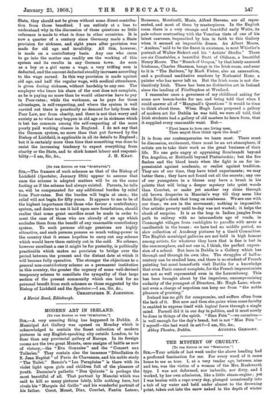MODERN ART IN IRELAND.
[TO TUE EDITOR OF THE "SPECTATOR."]
SIR,—A very amazing thing has happened in Dublin. A Municipal Art Gallery was opened on Monday which is acknowledged to contain the finest collection of modern pictures in any English-speaking city outside London, to be finer than any provincial gallery of Europe. In its foreign rooms are the two great Manets, once ensigns of battle as now of victory,—the "Eva Gonzales" and the "Concert aux Tuileries." They contain also the immense "Decollation de S. Jean Baptist" of Puvis de Chavannes, and his noble study " The Toilet." Renoir's "Les Parapluies " is there with its violet light upon girls and children full of the pleasure of youth. Daumier's pathetic "Don Quixote" is perhaps the most beautiful of all. That portrait by Mancini which was said to kill so many pictures lately, kills nothing here, but rivals his "Marquis del Grillo " and his wonderful portrait of his father. Corot, Monet, Diaz, Courbet, Fantin Latour,
Bousseau, Monticelli, Masis, Alfred Stevens, are all repre- sented, and most of them by masterpieces. In the English room there is a very strange and beautiful early Watts, its pale colour contrasting with the Venetian tints of one of his latest canvases, bequeathed by him in faith to this Gallery when it seemed an impossible dream. An Albert Moore, "Azaleas," said to be the finest in existence, is next Whistler's portrait of Walter Sickert and his "Artists' Studio." There are six Constables, a beautiful Stott of Oldham, a beautiful Henry Moore. The "Bunch of Grapes," by that lately annexed Irishman, Charles Shannon, hangs in the Irish room, and near to it is "The Bathers," by Mark Fisher, also an annexation, and a profound meditative seashore by Nathaniel Hone, a painter who has never left us. But the Irish room is not dis- tinctively Irish. There has been no distinctive art in Ireland since the landing of FitzStephen at Wexford.
I remember once a governess of my childhood asking for some new lesson-books for me, and being told that when I could answer all of " Mangnall's Questions" it would be time to think about them. When Hugh Lane proposed a gallery of modern art for Dublin he was told, we were all told, that Irish students had a gallery of old masters to learn from, that it supplied every reasonable want. But- " First learn to love one living man, Then mayst thou think upon the dead."
It is from our contemporaries we learn most. There must be discussion, excitement, there must be an art atmosphere, if artists are to take their work as the great business of their life. No one gets angry at appraising Rembrandt beyond Fin Angelico, or Botticelli beyond Pinturicchio ; but the fire flashes and the blood heats when the fight is on for im- pressionist against academic, or realist against tradition. They are of our time, they have tried experiments ; we may better them ; they have not found out all the secrets ; any one of our youngsters in a blouse may have a brush in his palette that will bring a deeper mystery into quiet woods than Courbet, or make yet another ray shine through old brown draperies in Mancini's way till they seem like Saint Brigit's cloak that hung on sunbeams. We are one with our time ; we are in the movement ; nothing is impossible. Our artistic poverty until to-day was not wasted ; it helps the shock of surprise. It is as the leap in Indian jungles from path to railway with no intermediate age of roads, in Connaught villages from rushliglats to paraffin with never a candlestick in the house : we have had no middle period, no slow collection of Academy pictures by a timid Committee. The English municipal galleries are not held in high honour among artists, for whatever they have that is fine is lost in the commonplace, and not one is, I think, the perfect expres- sion of a school. But here in Dublin is a Gallery which has through and through its own idea. The struggles of half-a. centurycan be studied here, and there is no student of French painting but must henceforth visit Dublin for a knowledge that even Paris cannot complete, for the French impressionists are not so well represented even in the Luxembourg. This has been brought about by the imperious, uncompromising audacity of the youngest of Directors, Mr. Hugh Lane, whom not even a charge of nepotism can keep me from "the noble pleasure of praising."
Ireland has no gift for compromise, and suffers often from the lack of it. But now and then she gains when some faculty is enabled to express itself with logical force through a single mind. Parnell did it in our day in politics, and it must surely be done in things of the spirit. "Sinn Fein "—we ourselves— is well enough for the day's bread, but is not " Mise Fein "- I myself—the last word in art P—I am, Sir, &c.,




















































 Previous page
Previous page